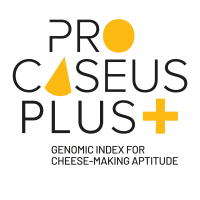What is Pro Caseus+
The Pro Caseus+ index is the genomic index for cheesemaking aptitude, currently applied to the Holstein breed.
Pro Caseus+ is the new tool that allows dairy farmers to improve the production of milk for processing into cheese. This means higher cheese yield, and also more quality, and therefore sustainable production, with positive effects in terms of sustainability for the entire supply chain.
The dairy farmer who chooses Pro Caseus+ index animals knows that he is breeding for superior cattle with a strong aptitude for cheese making and producing better milk.
Milk that comes from Pro Caseus+ cows has a better cheese yield, a curd with the right consistency and optimal processing times.
What is the Pro Caseus+ index
The Pro Caseus+ index is the genomic index for cheese-making aptitude, patented by the University of Padova and Intermizoo, for the moment applied to the Holstein breed.
With Pro Caseus+ it is possible to genomically test any Holstein animal, in order to estimate its genetic value in terms of cheese-making aptitude.
The Pro Caseus+ genomic test is based on a group of specific genes correlated with cheese-making aptitude.
What is Genomics – The advantages of genomic selection
Genomics is a branch of molecular genetics that allows the study of the genetic heritage of living beings.
Through genomics, Intermizoo estimates the traits of interest, such as milk, fat and protein production. On the basis of these measurements, Intermizoo selects, i.e. identifies, the best individuals and then multiplies them.
Cheese-making aptitude of milk
The estimation of economic values for cheese-making aptitude is crucial to propose breeding strategies aimed to improve milk characteristics both in yield and quality, especially when it comes to PDO cheese production.
Cheese-making aptitude will become a very important tool for milk destined for processing into cheese.
What is the cheese-making aptitude
The cheese-making aptitude: it can be defined, in general, as the capacity of milk to react with a coagulant and to form a curd of suitable consistency and within the optimal time for processing. The cheese-making aptitude measures a fundamental step in the transformation of milk into cheese which is coagulation. The measurement is carried out using an ad hoc instrumentation called lactodynamograph.
It is important to underline the fact that, as reported by some authors and sector operators, in these years there is a gradual reduction of milk classified as having an optimal cheese-making aptitude and a consequent increase of non-optimal milk, or milk that does not coagulate, after 30 minutes from the analysis.
What is cheese
For better explaining what cheese-making aptitude is, it is necessary to clarify and remind what cheese is.
Cheese, according to the legislative definition, is the “product obtained from whole milk, partially or totally skimmed, or from the cream of milk of any animal as a consequence of acid or presamic or enzymatic coagulation of caseinogen”.

